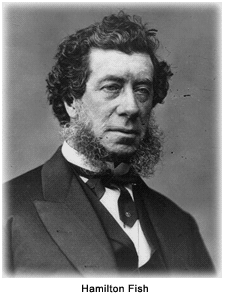 Hamilton Fish was born in New York City. His father was a local politician and named his son after his friend, Alexander Hamilton. Fish graduated from Columbia College (later University) in 1827 and three years later was admitted to the New York bar.
During the 1840s, Fish became active in Whig politics and served in the House of Representatives (1843-45) and later as New York's lieutenant governor (1847-49) and governor (1849-51).
In 1851 Fish was elected to the U.S. Senate where he served on the Foreign Relations Committee. He opposed the repeal of the Missouri Compromise and also, somewhat reluctantly, became aligned with the Republican Party. During this critical period, Fish was clearly a moderate, expressing criticism of both abolitionist and extreme proslavery forces.
During the Civil War, Fish served first as a member of a Defense Committee that cut red tape for the movement of soldiers and supplies, and later as a commissioner to investigate confinement conditions for prisoners of war in the South.
In 1869, Fish accepted what was thought to be a temporary appointment as secretary of state under Grant. He quickly established a distinguished record and remained to the end of Grant’s second term. Settlement of the Alabama claims and the Virginius affair were his chief successes, while the Dominican Republic purchase was a defeat he silently welcomed. Beyond his efforts in foreign affairs, Fish was a constant force working in opposition to the corruption and excesses of the Grant administration.
In 1877, Fish returned to private life where he long remained active in public affairs, in particular the continued development of Columbia College.
Hamilton Fish was born in New York City. His father was a local politician and named his son after his friend, Alexander Hamilton. Fish graduated from Columbia College (later University) in 1827 and three years later was admitted to the New York bar.
During the 1840s, Fish became active in Whig politics and served in the House of Representatives (1843-45) and later as New York's lieutenant governor (1847-49) and governor (1849-51).
In 1851 Fish was elected to the U.S. Senate where he served on the Foreign Relations Committee. He opposed the repeal of the Missouri Compromise and also, somewhat reluctantly, became aligned with the Republican Party. During this critical period, Fish was clearly a moderate, expressing criticism of both abolitionist and extreme proslavery forces.
During the Civil War, Fish served first as a member of a Defense Committee that cut red tape for the movement of soldiers and supplies, and later as a commissioner to investigate confinement conditions for prisoners of war in the South.
In 1869, Fish accepted what was thought to be a temporary appointment as secretary of state under Grant. He quickly established a distinguished record and remained to the end of Grant’s second term. Settlement of the Alabama claims and the Virginius affair were his chief successes, while the Dominican Republic purchase was a defeat he silently welcomed. Beyond his efforts in foreign affairs, Fish was a constant force working in opposition to the corruption and excesses of the Grant administration.
In 1877, Fish returned to private life where he long remained active in public affairs, in particular the continued development of Columbia College.